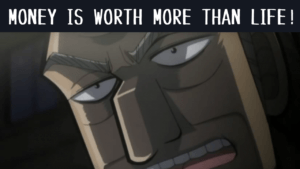Let’s learn Japanese with Jotaro’s quote from JoJo’s Bizarre Adventure (ジョジョの奇妙な冒険, JoJo no Kimyō na Bōken).
CONTENTS
Video
Jotaro’s Quote
Japanese: てめー正真正銘の史上最低な男だぜ。てめーのつけは金では払えねーぜ!
Romaji: temē shōshinshōmei no shijō saitei na otoko da ze. temē no tsuke wa kane dewa haraenē ze!
English: You truly are the lowest scum in history. You can’t pay back what you owe with money!
Analysis
てめー正真正銘の史上最低な男だぜ
てめー (pronoun) is a very insulting way to say “you”. It can also be written like this: てめえ.
正真正銘の (noun + particle) means “genuine” or “authentic”.
史上 (noun) means “in history”.
最低 (na-adjective) means “lowest” or “worst”.
When a na-adjective modifies a noun, な is attached to the adjective.
男 (noun) means “man”.
だ (auxiliary verb) is attached to a noun or na-adjective to affirm the statement.
ぜ (particle) is used at the end of a sentence to give a rough, casual tone, often used in male speech. It draws attention to the statement in a confident or cool way, similar to adding “hey” in English. It’s often heard in anime but rarely used in everyday conversation, as it sounds old-fashioned.
So, てめー正真正銘の史上最低な男だぜ means “You are genuinely the worst man in history”. In the anime, it translates to “You truly are the lowest scum in history.
てめーのつけは金では払えねーぜ
てめー (pronoun) with the possessive particle の means “your”.
つけ (noun) means “debt” or “what you owe”.
つけ originates from the concept of a tab or an unpaid bill that has been charged and must eventually be paid. In this context, it refers to all the harm or consequences that he has caused over time. So, after he pays the price with his life, Jotaro kindly leaves him a receipt.
は (particle) marks the topic of the sentence.
金 (noun) means “money”.
で (particle) indicates means or method, so 金で means “with money”.
払えねー (verb) is the contracted form of 払えない, meaning “can’t pay”.
The は particle here indicates contrast. It’s used with a negative outcome to show that the method—in this case, money—is ineffective or inappropriate, implying that another method might be possible.
ぜ (particle), again, draws attention to the statement with a rough, casual tone, often used in male speech.
So, てめーのつけは金では払えねーぜ means “You can’t pay your debt with money”. In the anime, it translates to “You can’t pay back what you owe with money”.
Examples
史上最◯
そのマラソンは史上最多の参加者数を記録した。
sono marason wa shijō saita no sankasha-sū o kiroku shita.
The marathon recorded the largest number of participants in history.
ウサイン・ボルトは100m走で史上最速のタイムを記録した。
usain boruto wa hyaku mētoru-sō de shijō saisoku no taimu o kiroku shita.
Usain Bolt recorded the fastest time in history in the 100-meter sprint.
今年、世界の平均気温が観測史上最高を記録した。
kotoshi, sekai no heikin kion ga kansoku shijō saikō o kiroku shita.
This year, the global average temperature reached the highest level ever recorded.
By placing words like 人類 (humankind), 日本 (Japan), or 観測 (observation/recorded) before 史上 (in history), you can specify the scope of history being referred to.
人類史上最強の男 – the strongest man in human history
日本史上最悪の事件 – the worst incident in Japan’s history
自分史上最高の体重 – the highest weight in my history
Words containing the character 最 are typically treated as nouns, which take の when modifying another noun. However, some words like 最低 (lowest) or 最悪 (worst) can also function as na-adjectives, taking な when modifying a noun, often when expressing personal, emotional, or subjective judgments, rather than objective facts.
最低の点数 – the lowest score (objective, factual)
最低な点数 – terrible score (subjective, emotional)
Noun + で (Method) + は (Contrast) + Negative Outcome
自転車では間に合わないよ!車で送ってあげる。
jitensha dewa ma ni awanai yo! kuruma de okutte ageru.
You won’t make it on time by bicycle! I’ll give you a ride.
その洗剤では頑固な汚れは落ちないよ。こっちを試してみて。
sono senzai dewa ganko na yogore wa ochinai yo. kocchi o tameshite mite.
With that detergent, stubborn stains won’t come off. Try this one.
メールでは本当の気持ちを伝えられない。
mēru dewa hontō no kimochi o tsutaerarenai.
You can’t convey your true feelings through email.
For positive results or affirmations, なら is usually used instead of では because there’s no need to draw a contrast, and it simply identifies the method or condition that allows it to work.
自転車では無理だけど、車なら余裕で間に合うよ。
jitensha dewa muri dakedo, kuruma nara yoyū de maniau yo.
It’s impossible by bike, but if it’s by car, I’ll easily make it on time.
Support Easy Peasy Japanesey
If you enjoy our content, please consider supporting Easy Peasy Japanesey. Your support will help keep us going. Thanks for all your support!


